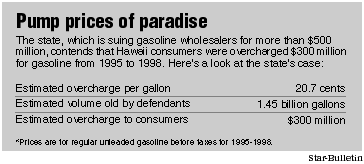

Lawyer:
Gas price gouging
cost $500 million
The state's lead antitrust
By Rob Perez
attorney says excessive wholesale
prices have cost Hawaii dearly
Star-BulletinTHE Oahu refinery of Chevron Corp. is three times more profitable than the company's two California refineries, largely because of the excessive wholesale prices Chevron charges for gasoline here, an attorney representing the state says.
The price gouging by Chevron and other major gas wholesalers in Hawaii has drained more than $500 million from the local economy since 1995, according to Spencer Hosie, the lead attorney for the state's antitrust lawsuit against the companies.
Hosie leveled the latest accusations yesterday in an interview with the Star-Bulletin. He has met with legislators and reporters this week to discuss the status of the lawsuit, which was filed in October and alleges the companies conspired to keep prices artificially high for at least a decade.
Chevron, the leader in Hawaii's gasoline market, yesterday accused the San Francisco attorney of trying to argue the lawsuit in the media even before the first court hearing has been held.
"It's really repugnant to be trying their case in the press before going to court," said Bob Mittelstaedt, a San Francisco attorney representing the company.

Asked about Chevron's profitability levels, Mittelstaedt said such information was proprietary and irrelevant to whether a conspiracy existed.He said the state has not been able to produce any evidence to support its conspiracy allegation because such a conspiracy never existed. Citing that argument, Chevron and the other defendants have asked a federal judge to dismiss the lawsuit.
In raising the notion of excessive profits in Hawaii, Hosie said Chevron's Barbers Point refinery generates three times the return on an invested dollar than the company's much larger California refineries.
Although refineries produce a variety of petroleum products, the higher Hawaii return is primarily due to the excessive wholesale profit margins for gasoline, which are roughly three times the average levels found in California, New York and nationally, Hosie said.
The other products produced by Chevron's local refinery have margins more in line with those found elsewhere, he said.
Hosie acknowledged that his estimates of Chevron's profitability levels were not based on company data but various industry and government reports and the analysis of experts who have done similar calculations in other cases.
"We know this is right. We've done this enough to know," said Hosie, who has had other antitrust cases against oil companies.
Mittelstaedt said he didn't know enough about how Hosie arrived at the estimates to dispute them, but reiterated that profitability levels are irrelevant to proving a conspiracy.
He denied outright, however, that any overcharging occurred, because that would have required a conspiracy.
"This case is about whether a conspiracy existed, not about making more profit in one area over another," he said.
According to the state's analysis, consumers have been overcharged an estimated 20.7 cents a gallon since 1995, or roughly $300.3 million. That equates to about $2,500 for each man, woman and child in Hawaii.
Considering the multiplier effect that such spending would have had if the money had not gone to oil company profits, the state economy has lost an estimated $537.5 million over the past four years, Hosie said.
In discussing the status of the lawsuit, Hosie complained that Chevron has said it will attempt to block the state's efforts to obtain company documents and testimony in an evidence-gathering process known as discovery.

Both sides in a lawsuit have a right to discovery, and if Chevron does try to block the state's evidence gathering, that would be unfair and unprecedented, Hosie said."They just want to stop us cold," he said.
But Mittelstaedt said the state shouldn't be able to proceed with discovery until the court rules on the defendants' motions to dismiss the lawsuit.
A hearing on the motions is scheduled March 1.
The state is seeking more than $500 million in damages from the oil companies. One indication of the high stakes involved is the legal firepower both sides have mobilized.
The companies have hired some of the top law firms in Hawaii to help with their defense and are using mainland firms as well.
On the state's side, about eight attorneys from Hosie's firm and a local firm have been working on the case essentially full time, and more will join the effort once the discovery process starts, he said.
So far, many hundreds of thousands of dollars worth of attorney fees have been expended on the state's case, Hosie said.
That only will be recouped if the state prevails or obtains a settlement.